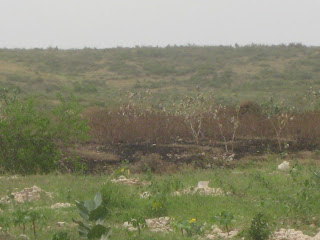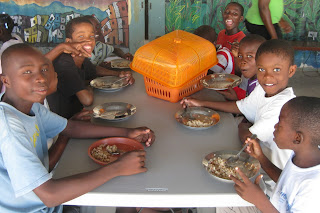Adrenaline is a pretty awesome hormone. It kicks in with just enough of itself to carry me through the long work stretches, and it seems to know the exact moment to cease surging through my body. The only challenge with this scenario is that it takes me three days to recover back to a sort of chemical homeostasis. I only slightly exaggerate – today I am feeling almost back to myself, but I physically felt the disappearance of energy this past Friday morning. I woke up grateful for a weekend off, promptly got a call from one of our nurses who was with a little Ste. Anne kiddo at the hospital, went to be with them for the duration of their doctors' visit, came back and Skyped with friends for a brief while, feeling perfectly normal. Seconds after the phone call was over I suddenly wondered if I could even make it to my bed from the couch without collapsing from exhaustion. The body knows when the limit has been reached!
My working weekend consisted of our usual visit to the baby house on Saturday (the doctor has hours at St. Louis two afternoons a week, and visits Ste. Anne every Saturday) and updating vaccination records to include the most recent campaign. Sunday has turned into more of a planning day – I went to St. Louis in the morning and encountered five boys with high fevers, three positive for malaria, and four of the five from the same house. Pesky hungry mosquito! We have treatment for malaria, but the misery of suffering a fever of around 104 degrees is amplified by the heat in the containers. Add to that nausea and a headache, and these guys were suffering quite a bit! One of the temporary solutions subscribed to by the nurses here is to send kids to the cold showers as often as needed. It is a very short-term fix, but the kids come back a bit cooler. Tylenol and Ibuprofen only work so well in the presence of a malaria flare-up, but those are given as well. After a little bit of soup, a somewhat peaceful sleep arrived for the patients, and I continued delving into ideas for education sessions for staff and kids. There are many topics to choose from, but hand hygiene and basic first-aid are two that are foremost in my mind. A wonderful Sunday evening mass by candlelight ended the weekend with grace.
Monday morning the fevers were persistent, and the boys were exhausted from fighting illness. One little guy was concerning me, as his temperature continued to stay very high and he kept refusing food and water. The other guys were responsive, wanted their usual spaghetti instead of soup, and kept asking for water. Yay! Appetites on the rebound. At the end of the morning, another little girl came in with a headache. As I poured water for her, she looked in the cup for a long time, then handed it to me. Lo and behold, there was a little worm swimming away to his heart's content. After a gasp and a look into the container from which the water had come, there was yet more evidence that something was not right. A brief investigation and tracing of the water source revealed that for several days, water for the clinic and other “kays,” or houses, was being retrieved from an untreated spigot in the courtyard, instead of at the treated, filtered well located at the front of the property. The eternal challenge of good communication and the attention to directions continues to plague daily life, so staff was immediately informed (again) of the importance of obtaining water from the correct source. And my mind began racing as to what might be in the “bad” water. Parasites are endemic and dangerous, and the sudden increase in parasitic infections in the kids was now explained. Our concerns grew to include Typhoid, and then cholera, the ultimate enemy.
The directors and the doctor were quick to address the issue, and after a bit of research and chatting with Sr. Judy, the best of our resources for tropical medicine, we found that we had a plentiful supply of the right medications for Typhoid. Should cholera enter the picture, we are literally feet away from the cholera treatment center, St. Philomen.
Tuesday, Wednesday and Thursday, we watched our little group of boys grow by a few more – all from the same container, and were somewhat relieved to get another positive diagnosis of malaria confirmed for one of them. We decided to treat for both malaria and typhoid, just in case there was a typhoid presence in the water. It is an interesting experience to treat such a high fever here as opposed to the States. There is not the relief of air-conditioning, the ready availability of cold compresses, or the interest in the prompt administration of IV fluids for dehydration. (Note: we do have the fluids and equipment available to start IV's – but very rarely is that a step taken in the current clinic setting). We improvised with gauze and cold water from the refrigerator, sat the boys up for soup, kept encouraging water and oral rehydration salts, and located an additional fan. Panic and worry would get us nowhere – patience and faith was required. The Haitians are much better at this idea than we Americans. Move with deliberation, take the necessary steps to ensure the most comfort available, and then sit and allow ths illness to take its course. As of this weekend, to our relief, the kids and staff at FWAL have been protected from further water-borne illness.
The nurses continue to amaze me. They are trusting me more when I make suggestions to them, asking more questions about courses of treatment and medications, giving input more freely, and want to just be with me. They laugh and laugh, and I am grateful that our senses of humor seem to be similar in many ways. They love joking with me, and they love the look on my face when I attempt to eat a “pate,” or a fried, chicken-filled pastry, and I hit the “piklis,” or the spicy Haitian mixture of cabbage, carrots and spices. (I have a wimpy tongue with regards to tolerance of spiciness). They like sitting and just talking, are trying to convince me to stop such cosmetic practices as shaving legs and under-arms, and want me to dye my hair black! I have informed them that certain things will NOT happen, and I am thinking I have to bring back a photo of myself from “King and I” high-school musical days which clearly shows that I am not meant to have dark hair. They continue to express disbelief that I am not married and have no children, and gave me the Spanish Inquisition as to my list of essential attributes. “We will pray, but we will also start looking!” Yentas without borders...
I was thrilled to know that one of the nurses, Jelita, wanted my company on Friday morning at the hospital. One of our kids was ill and needed to be seen by a doctor promptly. We nurses have been discussing autonomy and our authority to decide treatment courses for the kids, and I was glad she had decided to seek treatment for the child immediately versus waiting for the FWAL doctor's availability. One of the gifts of working where I do is the accessibility of St. Damien clinics and the triage area which is open every morning. If any of our children requires attention on dates when our doctor is not present on-site, or if an acute condition develops which is beyond our ability to manage, the hospital is literally yards away from St. Louis, right outside my door, and just a short 10-minute drive from the baby house. I arrived at the exam room to be greeted by the little girl, who just wanted me to hold her and talk to her. We practiced words for the different animals that are posted outside the rooms, looked at the cross and Jesus, reviewed all the parts of the face, and just snuggled. Daphnee has undergone a transformation since her arrival a month ago. She was very scared and angry when she first joined Ste. Anne, would sob uncontrollably when anyone left the home or when she needed to leave school, screamed and bit and fought, and had a very sad disposition. I have had the chance to be with her on several different occasions, to sit next to her, to play and talk with her, and wave at her as she sits in class at school. I have seen the return of her huge, laughing grin. Now, she runs to me and wants to hold my hand, if not to be held on my lap! There are countless moments like these at FWAL, when I am able to witness the joy of a child who knows he/she is safe, loved and secure.
 |
| Daphnee |
Jelita, Daphnee and I, talked and talked, and I had an overwhelming feeling of gratitude and amazement at the graces present to me. We adults had an extensive conversation, and we understood each other the entire time. I was trusted by a Haitian nurse to be a source of support and a welcome presence for her, and I was trusted by another of the precious kiddos in my care. We saw the doctor, Jelita spoke appropriately and assertively with the doctor examining Daphnee, and she looked at me once the needed medications were prescribed. We have also been reviewing brand name versus generic ingredients of medications, a challenging concept here, as so many languages, names and spellings are involved. And, to her relief, I was able to help her realize that another several-hour wait at the pharmacy was not necessary, as we had all of the meds at our facility!
I leave you with pictures from our chapel. The building was damaged in the earthquake – part of the stone wall behind the altar fell, and it was replaced by wooden buttresses and panels. This past month, an American artist came and painted a spectacular mural to cover the dark wood, and blended it in with the stonework in the rest of the chapel. The mural is a beautiful representation of the progress of the country and its children since the earthquake, and a great gift which lightens the chapel immensely. Just imagine being able to enter in the evening with candles lighting every window, piercing the darkness and welcoming the hungry.
 |
| graves of nuns who died in the earthquake |
 |
| buttresses holding up the walls |
 |
| The chapel is always open. |



























